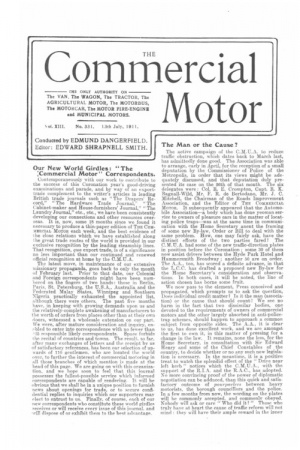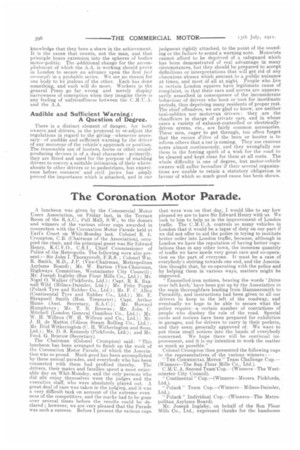Our New World Girdles: " The :Commercial Motor" Correspondents.
Page 1

Page 2

If you've noticed an error in this article please click here to report it so we can fix it.
Contemporaneously with our work to contribute to the success of this Coronation year's good-driving examinations and parade, and by way of an exporttrade complement to the writer's articles in leading British trade journals such as " The Drapers' Record," "The Hardware Trade Journal," " The Cabinet-maker and House-furnishers' Journal," "The Laundry Journal," etc., etc., we have been consistently developing our connections and other resources overseas. It is, now, some 18 months since we found it necessary to produce a thin-paper edition of THE COMMERCIAL MOTOR each week, and the best evidence of the close relations which we have established along i he great trade routes of the world is provided in our exclusive recognition by the leading steamship lines. That recognition, q11,42 export trade, is of a significance no less important than our continued and renewed official recognition at home by the C.M.U.A.
The latest move, in maintenance of our extensive missionary propaganda, goes back to only the month of February last. Prior to that date, our Colonial and Foreign correspondents might have been num'bored on the fingers of two hands : those in Berlin, Paris, St. Petersburg, the 'U.S.A., Australia and the Federated Malay States, Winnipeg and Southern Nigeria practically exhausted the appointed list, although there were others. The past five months have, in keeping with growing demands upon us and the relatively-complete awakening of manufacturers to
the worth of orders from places other than at their own doors, witnessed a wholesale extension on our part. We were, after mature consideration and inquiry, enbled to enter into correspondence with no fewer than 1.05 responsible likely correspondents. Space forbids the recital of countries and towns. The result, so far, after many exchanges of letters and the receipt by us of satisfactory references, has been our selection of upwards of 110 gentlemen, who are located the world over, to further the interest of commercial motoring in all those branches of which mention is made at the head of this page. We are going on with this organization, and we hope, soon to feel that this iournal possesses the fullest-possible service which informed correspondents are capable of rendering. It will be obvious that we shall be in a unique position to furnish news about openings for trade, or to secure confidential replies to inquiries which our supporters may elect. to entrust to us. Finally, of course, each of our new correspondents who constitute these world girdles receives or will receive every issue of this 5onrnal, and
will dispose of or exhibit them to the best adventage.
The Man or the Cause ?
The active campaign of the C.M.U.A. to reduce traffic obstruction, which dates back to March last, has admittedly done good. The Association was able to arrange, early in April, for the reception of a small deputation by the Commissioner of Police of the Metropolis, in order that its views might be adequately discussed, and that deputation duly presented its case on the 26th of that month. The six delegates were : Col. R. E. Crompton, Capt. R. K. BagnalI-Wild, Mr. F. R. de Bertodano, Mr. J. 0. Mitchell, the Chairman of the Roads Improvement Association, and the Editor of THE COMMERCIAL MOTOR_ It subsequently appeared that the Automobile Association—a body which has done yeoman service to owners of pleasure cars in the matter of locating police traps—was at the same time in communication with the Home Secretary anent the framing of some new By-law, Order or Bill to deal with the same problem. How, one may fairly ask, have the distinct efforts of the two parties fared? The C.M.U.A. had some of the new traffic-direction plates in position before the Coronation ; some 30 of them now assist drivers between the Hyde Park Hotel and Ffammersmith Broadway ; another 50 are on order. The A. A., too, has scored a definite advance, in that the L.C.C. has drafted a proposed new By-law for the Home Secretary's consideration and observations. In both cases, it will be noted, the line of action chosen has borne some fruit.
We now pass to the element, Press conceived and propagated, which prompts us to ask the question, Does individual credit matter Is it the man (association) or the cause that should count ? We see no harm in the fact that two dissimilar bodies, one devoted to the requirements of owners of commercial motors and the other largely absorbed in anti-policetrap schemes, should happen to approach a common subject from opposite sides. The A.A., it is clear to us, has done excellent work, and we are amongst the first to own it, in this matter of pressing for a change in the law. It remains, none the less, for the Home Secretary, in consultation with Sir Edward Henry and some of the Chief Constables of the eountry, to decide whether or no any such new legislation is necessary. In the meantime, it is a positive treat to watch the splenilid effect of the " Drive near left kerb" notices which the C.M.U.A., with the support of the R.I.A. and the, R. A.C., has adopted. No more convincing proof of the power of diplomatic negotiation can be adduced, than this quick and satisfactory outcome of pour parlers between heavy motorists, the borough councillors and the police. In a few months from now, the wording on the plates will he commonly accepted, and commonly obeyed. Nobody will ask or care " Who did it? " Those who truly have at heart the cause of traffic reform will not mind : they will have their ample reward in the inner knowledge that they bore a share in the achievement. It is the cause that counts, not the man, and that principle bears extension into the spheres of bodies motor-politic. The additional change for the accomplishment of which the A.A. is working should prove in London to secure an advance upon the first fait flecompli in a probable series. We see no reason for one body to be jealous of the other. Each has done something, and each will do more. Workers in the general Press go far wrong and merely display narrowness of conception when they imagine there is any feeling of unfriendliness between the C. M.1.7. A. and the A.A.
Audible and Sufficient Warning:
A Question of Degree.
There is a distinct element of danger, for both owners and drivers, in the proposal to re-adjust the regulations in regard to the giving—whenever necessary— of audible and sufficient warning by the driver of any motorcar of the vehicle's approach or position. The reasonable use of hooters, horns or other soundproducing devices is of a dual character : primarily, they are fitted and used for the purpose of enabling drivers to convey a suitable intimation of their whereabouts to other drivers or to pedestrians, but experience before coroners' and civil juries has amply proved the importance which is attached, and in our judgment rightly attached, to the point of the sounding or the failure to sound a warning note. Motorists cannot afford to be deprived of a safeguard which has been demonstrated of real advantage in many circumstances, but they should be prepared to accept definitions or interpretations that will get rid of any obnoxious abuses which amount to a public nuisance at times, and most of all at night. People who live in certain London squares have legitimate cause of complaint, in that their ears and nerves are unnecessarily assaulted in consequence of the inconsiderate behaviour of drivers who hoot or toot for inordinate periods, thus depriving many residents of proper rest. The chief offenders, we are glad to know, are neither taxi-cabbies nor motorvan drivers : they are the chauffeurs in charge of private cars, and in whose cases a variety of exhaust-controlled or electricallydriven syrens, etc., are fairly common accessories. These men, eager to get through, too often forget that the raison. d'dtre of the horn or hooter is to inform others that. a car is coming. They use raucous notes almost continuously, and they wrongfully use them in the forcing spirit of a wish for the road to be cleared and kept clear for them at all costs. The whole difficulty is one of degree, but motor-vehicle owners will suffer hereafter if their several organizations are unable to retain a statutory obligation in favour of which so much good cause has been shown.




















